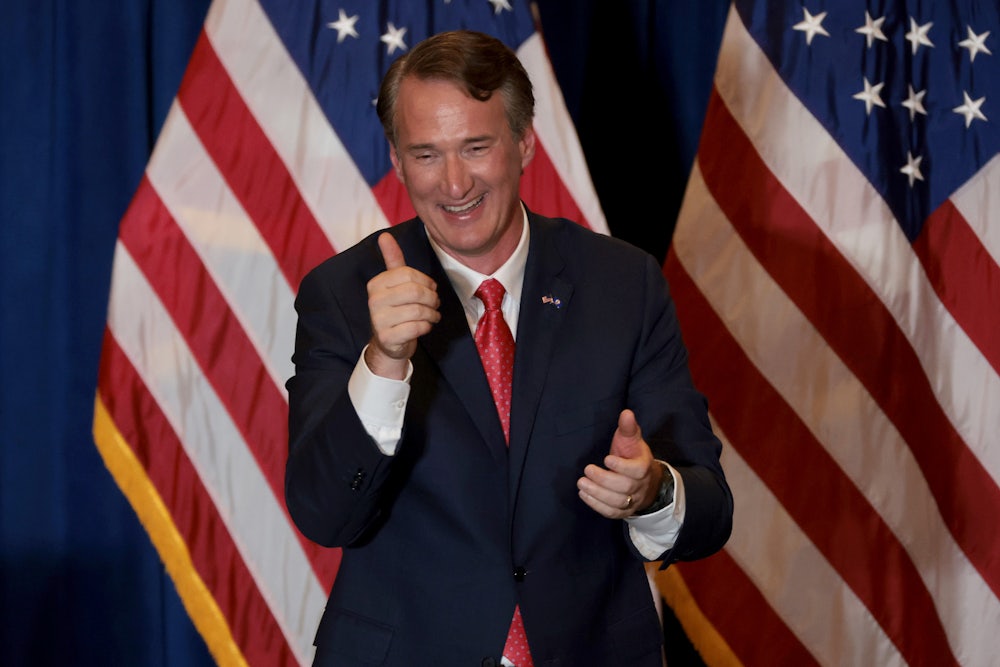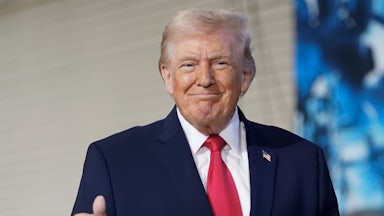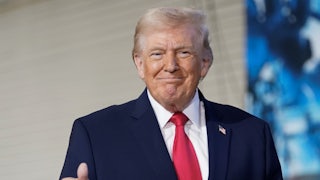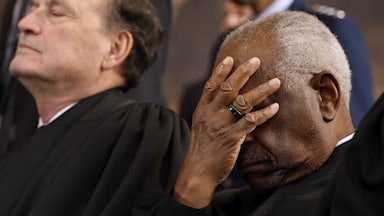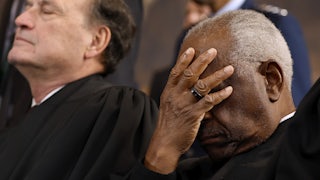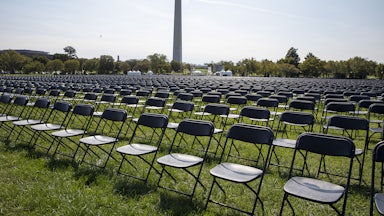Here we go again: There is suddenly an air of inevitability around Donald Trump. Yes, he is diminished. For well over a year, it has been clear that he no longer has the iron hold on either his party or the news media—the swagger and sway that defined his first presidential campaign and presidency. Obviously, he is under indictment. Clearly, he is deranged. Increasingly fixated on personal vendettas, he has descended into a particularly myopic form of despotic self-regard, delivering speech after speech detailing the various shadowy and opaque conspiracists who are out to get him. Obviously, he has a new slate of rivals. Trump may have broken the mold back in 2016, but now there are a host of imitators scattered hither and yon across the country; he is no longer the only person selling some repugnant mix of nativism, barbarism, and commitment to total culture war.
Yet Trump’s rivals are proving to be a problem—at least to one another. For months, it seemed like Florida Governor Ron DeSantis sat in the pre-primary catbird seat. Riding media buzz that portrayed him as a saner, smarter Trump—you know, the kind of guy who you would want to get a beer with after a long day of banning books and “not saying gay”—DeSantis was the Punditland favorite as a Trump replacement.
Republican voters wanted something different, went the telling, but not too different. Here’s Ronny: He’s an ardent culture warrior with a willingness to pick stupid, unnecessary fights with “woke” companies like Disney but not as likely to, say, start nuclear war with a tweet at 2:37 in the morning. But the pundits propping up DeSantis overlooked one thing: He’s an uncharismatic weirdo with little national experience. And as the spotlight has turned his way in recent months, so too has he faded: Trump currently leads him in some polls by more than 20 points.
And so those looking for a kinder, gentler Trump must seek elsewhere. Enter Virginia Governor Glenn Youngkin.
Youngkin is, on paper, an intriguing choice to fill the role of “Trump but less scary.” To his credit, he is a proven winner, one who can win in daunting conditions at that. In 2021, he romped to victory—thanks to a combination of a dog-whistle campaign about education (more of the woke agenda stuff of which Republicans can’t get enough) and his opponent, former Governor Terry McAuliffe, who ran what was largely regarded as a world historically bad campaign but who nevertheless received the largest number of votes of any Democrat in Virginia’s history. Youngkin has since shown that he can succeed, at least on some metrics, in a blue state: He currently boasts an approval rating of 57 percent.
Writing in Politico earlier this week, John F. Harris summed up the pro-Youngkin case in a piece titled “Glenn Youngkin Would Be Crazy Not to Run for President”:
The reasons Youngkin could win over the voters Romney could not—and be an intriguing addition to the field—are more complex. Republicans are divided over the question of division. Do people want an end to the politics of conflict and bombast represented by Trump and his one-time protégé, Florida Gov. Ron DeSantis? Or is exploiting the alleged cultural and ideological excesses of the Democratic left the path to defeating President Joe Biden? Youngkin’s potential appeal is that it isn’t necessary to decide—just say yes to both questions.…
The reality is that Youngkin is less an updated version of Mitt Romney than he is of someone who actually became president, George W. Bush. Apparently by chance rather than design, what Youngkin articulates is something very much like “compassionate conservatism,” the credo that got Bush elected in 2000 and then went into retreat as he became a war president after 9/11 and the Iraq War. That is reflected in Youngkin’s prominent advocacy of improved state mental health services—“Nobody has been spared this crisis”—and a state partnership with the impoverished and predominantly Black city of Petersburg, just south of the capital.
Elsewhere, Harris makes the case that Youngkin isn’t really in the DeSantis mode either. Yes, he’s a culture warrior who likes telling students which books they can and can’t read. But he also goes on television (mostly Fox News) to explain himself, and when he does it, he makes the case that, as Harris pulls from a recent interview with his publication, the Republican Party needs to be a big tent: “What I’d seen in Virginia, and I think I see across this nation, is we in fact have to bring people into the Republican Party, we have to be additive, not [rely on] subtraction.” This, Harris says, also makes Youngkin like Bill Clinton.
It all makes for an intriguing theoretical candidate! Here is a guy who’s popular in a blue state, who has shown an interest in persuasion, and who seems like an off-ramp from the era of increased conflict and polarization that has defined American politics for well over a decade at this point. Seems great!
Closer scrutiny, however, reveals a few problems with this thesis. For one, Harris’s fixation on Romney as some exemplar isn’t an accident. Harris reads Youngkin like so: “Youngkin’s biography, a wealthy private-equity executive known for his earnest religiosity, conveys a superficial resemblance to Mitt Romney. The 2012 nominee was an establishment natural and may have won some suburban independents that Donald Trump never could—but hardly enough to compensate for his lack of populist energy.”
It’s fair to say that Youngkin and Romney have many similarities. For one, Youngkin’s popularity in Virginia, a well-off state that votes Democrat but has a huge constituency of suburban voters, largely comes from him being, in most respects, a fairly typical pro–big business Republican. Fair enough: That is, to his core, who he is!
But Harris’s account glosses over some key factors. For one, his electoral success in Virginia was spun from a formula that is probably not replicable in a Republican primary. He largely campaigned as a quiet, unassuming Republican who strained to keep Trump’s name out of the race and Trump’s body at arm’s length. He also strove to keep the fearmongering about schools and crime at dog-whistle volume—something that his party, and his would-be primary opponents, aren’t likely to accommodate, especially if he tries to stick to some “RINO” lane.
But Youngkin still maintains a much bigger appetite for stoking made-up culture-war conflicts than Romney ever evinced—particularly when it comes to how gender, sexuality, and America’s dismal racial history are taught in Virginia schools. And so it’s very likely that Youngkin, the presidential candidate, will not resemble the person Harris imagines.
Yes, Youngkin has not governed Virginia with the same culture-warrior zeal that DeSantis has shown. But he also can’t. Virginia has a divided legislature: Democrats control the Senate, while Republicans have an edge in the House of Delegates. This also explains Youngkin’s relative popularity: He can’t really get a lot done.
But that’s not for want of trying. Youngkin has picked endless fights with Virginia public schools, particularly in bluer northern Virginia where Youngkin’s “parents’ choice” credo is colliding with parents whose choices aren’t aligning with his. He is not as bad as DeSantis on trans rights issues, though that’s not saying much (essentially a separate but equal system, in which students use the bathroom associated with their sex assigned at birth but also calling for gender-neutral bathrooms for trans students). Still, he is very much the culture warrior that DeSantis is, and his “issues” in a GOP primary won’t be much different—unless he wants to alienate the voters that Republicans have spent the last several years cultivating.
For years now, a certain segment of the media elite have hunted their Sasquatch: a mythical Trumpish candidate who can appeal to the voters who thrill to the former president’s racism and chaos but who isn’t so overt in these affectations and is possessed of the ability to wield that chaotic energy to ends more purposeful than an ego trip. Here in the luminous luster of the pre-primary scene, these political touts can dream their little dreams and content themselves with the notion that Youngkin ticks their boxes. But there are firmer tests to come, and no indication that Republican voters want the Glenn Youngkin of Harris’s imaginings to be their presidential standard-bearer. Should the Virginia governor run in 2024, something will have to give way. It’s likely to be these pundits’ delusions.
